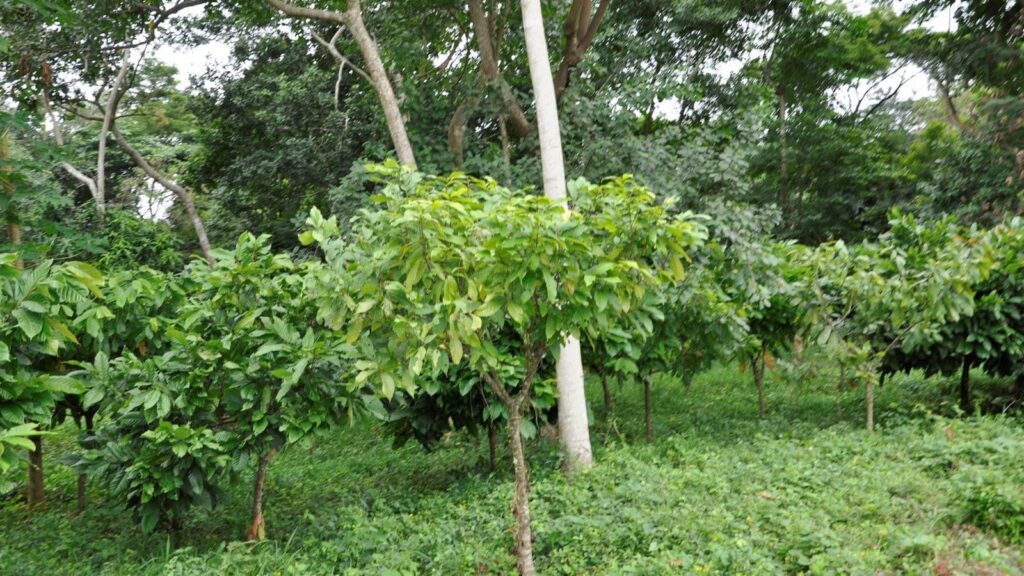Nestlé and Olam Food Ingredients (ofi) have announced a major initiative aimed at enhancing the sustainability of their cocoa supply chains. This collaboration will involve agroforestry on 72,000 hectares of cocoa farms, with plans to plant 2.8 million trees across farms in Brazil, Nigeria, and Côte d’Ivoire over the next five years. The project, which involves approximately 25,000 farmers, is designed to improve both the environmental and economic sustainability of cocoa farming in these regions.
Agroforestry, the practice of integrating trees and shrubs into traditional agricultural systems, is seen as a key strategy for boosting climate resilience. It can help mitigate soil erosion, reduce water runoff, and increase carbon sequestration, all of which are vital for maintaining the health of ecosystems and combating the impacts of climate change. Additionally, the trees planted through this initiative can offer farmers supplementary sources of income, further supporting their livelihoods.
The partnership between Nestlé and ofi marks their largest joint project in their 15 years of collaboration. As part of the project, farmers will receive training on best agroforestry practices, as well as broader environmental and sustainability topics. This training will encompass various international standards, including the African Regional Sustainability Standard (ARS) and the European Union’s Deforestation Regulation (EUDR), which aims to ensure sustainable sourcing of raw materials such as cocoa. Financial incentives will also be provided to farmers, encouraging them to plant and maintain the trees in line with the project’s goals.
The 2.8 million trees will be planted with the intention of not only increasing climate resilience but also enhancing biodiversity in the region. The goal is to transform the cocoa farms into more regenerative systems that will support long-term sustainability. Digital tools will be employed to ensure the credibility and traceability of the project’s activities. For instance, ofi will use its AI-powered Carbon Stock Monitoring tool to measure and track the carbon stock of the farms before and after the trees are planted. This tool will monitor the growth of the trees and ensure they are fulfilling their intended environmental roles. Another tool, the AtSource Digital Footprint Calculator (DFC), will be used to analyze carbon data and measure the environmental impact of the project.
This initiative is particularly timely as the cocoa industry faces increasing pressures from climate change. Last year, wholesale cocoa prices reached record highs due to adverse weather conditions caused by climate change, such as prolonged heatwaves and heavy rainfall during dry seasons in key cocoa-producing regions. The challenges brought on by these changing climate patterns highlight the urgency of adapting farming practices to be more resilient to such shifts.
Both Nestlé and ofi have faced criticism in the past for their links to deforestation, not only in cocoa but also in other commodities like palm oil. In response, Nestlé has committed to ensuring that all of its primary supply chains for forest-risk commodities, including cocoa, are deforestation-free by the end of 2025. By the end of 2024, the company had already achieved 93.5% of this goal. However, environmental groups like the Rainforest Action Network argue that the company’s target should be expanded to include a broader definition of deforestation.
Similarly, ofi has outlined ambitious sustainability goals under its Cocoa Compass strategy, including an increase in tree carbon stock in its cocoa supply chain by 2030. This initiative is part of a larger effort to align with the EUDR, which will prohibit the import of products linked to deforestation into EU markets starting in December 2025.
Through this partnership, Nestlé and ofi are setting a strong example of how businesses can address climate challenges while also promoting social and environmental sustainability within their supply chains. By empowering farmers with the knowledge, tools, and incentives they need to adopt climate-smart practices, the project aims to create a more resilient and sustainable cocoa sector for the future.

